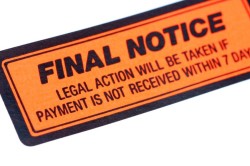Top Class Actions’s website and social media posts use affiliate links. If you make a purchase using such links, we may receive a commission, but it will not result in any additional charges to you. Please review our Affiliate Link Disclosure for more information.

The lawsuit was filed by plaintiff Jeffery Gobles, whose debt collection lawsuit against the Student Loan Finance Corp. asserts the debt collection company seeking to collect student loan payments broke federal law and engaged in debt collection harassment.
The Fair Debt Collection Practices Act regulates what debt collection companies can and cannot do. This law is designed to protect the public from aggressive debt collection harassment that can harm their employment. These laws came in response to pressure from victims of alleged debt collection harassment.
The law allows consumers to file FDCPA lawsuits against debt collection companies that allegedly break the law.
According to the debt collection lawsuit, the company seeking student loan payments has engaged in a campaign including making false threats and making false and deceptive statements. The debt collection lawsuit also alleges several procedural failures by the debt collection company.
Among the alleged false statements made by the defendant is a claim that the state of Colorado has a statute allowing for a collection of a 25 percent collection fee on a defaulted student loan, and that the company would file a debt collection lawsuit against him if he did not pay rapidly.
This FDCPA lawsuit seeks compensatory damages, which are designed to compensate the plaintiff, as well as injunctive relief, or a court order to stop the debt collection harassment.
Under the FDCPA, debt collection lawsuits may also seek to recoup legal fees, as Gobles has chosen, as well as statutory damages. Statutory damages are damages “automatically” tacked on under certain laws. For example, the FDCPA allows plaintiffs to collect a certain amount of money if they can prove that debt collection companies violated the FDCPA in the course of their alleged actions.
As this debt collection lawsuit shows, the FDCPA provides Americans with the tools to fight back against debt collection companies that violate the law. However, debt collection lawsuits are potentially complicated, as the FDCPA has many nuances. That’s why the FDCPA allows plaintiffs to seek legal fees as part of their relief.
The Debt Collection Harassment Lawsuit is Jeffrey S. Goble v. Student Loan Finance Corporation, Case No. 3041, in the U.S. District Court for the District of Colorado.
Join a Free Unfair Debt Collection Class Action Lawsuit Investigation
If a lender or debt collector engaged in unfair debt collection practices, you may have a legal claim and could be owed compensation for violations of the Fair Debt Collection Practices Act (FDCPA).
DISCLAIMER: Debt collection itself is not illegal. However, debt collection firms collecting on consumer debts must adhere to the FDCPA. Even though debt attorneys are investigating these companies, their debt collection practices may be legal.
ATTORNEY ADVERTISING
Top Class Actions is a Proud Member of the American Bar Association
LEGAL INFORMATION IS NOT LEGAL ADVICE
Top Class Actions Legal Statement
©2008 – 2024 Top Class Actions® LLC
Various Trademarks held by their respective owners
This website is not intended for viewing or usage by European Union citizens.














